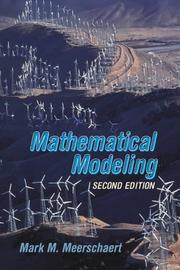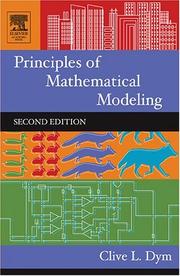| Listing 1 - 10 of 20382 | << page >> |
Sort by
|

ISBN: 0124876528 9780124876521 Year: 1999 Publisher: San Diego (Calif.) : Academic press,
Abstract | Keywords | Export | Availability | Bookmark
 Loading...
Loading...Choose an application
- Reference Manager
- EndNote
- RefWorks (Direct export to RefWorks)
Book
Year: 2013 Publisher: Waltham, MA : Academic Press/Elsevier,
Abstract | Keywords | Export | Availability | Bookmark
 Loading...
Loading...Choose an application
- Reference Manager
- EndNote
- RefWorks (Direct export to RefWorks)
"Meerschaert's new edition strengthens his position as the survey text of choice for mathematical modeling courses, adding ample instructor support and leveraging on-line delivery for solutions manuals and software ancillaries. From genetic engineering to hurricane prediction, mathematical models guide much of the decision-making in our society, and if the assumptions and methods underlying the modeling are flawed, the outcome can be disastrously poor, as recent events have proved. Since mathematical modeling is a rapidly growing specialty with applications in so many scientific and technical disciplines, there is a need for mathematically rigorous treatments of the subject, and particularly for texts that expose students to a range of possible approaches."--Publisher's website.
Periodical
ISSN: 23969040 Year: 1989 Publisher: ENGLAND : Sci-Tech Information Services,
Abstract | Keywords | Export | Availability | Bookmark
 Loading...
Loading...Choose an application
- Reference Manager
- EndNote
- RefWorks (Direct export to RefWorks)
Book
ISBN: 9897582371 150905894X Year: 2016 Publisher: Piscataway, NJ : IEEE,
Abstract | Keywords | Export | Availability | Bookmark
 Loading...
Loading...Choose an application
- Reference Manager
- EndNote
- RefWorks (Direct export to RefWorks)
The purpose of the 6th International Conference on Simulation and Modeling Methodologies, Technologies and Applications (SIMULTECH) is to bring together researchers, engineers, applied mathematicians and practitioners interested in the advances and applications in the field of system simulation Four simultaneous tracks will be held, covering on one side domain independent methodologies and technologies and on the other side practical work developed in specific application areas The specific topics listed under each of these tracks highlight the interest of this conference in aspects related to computing, including Conceptual Modeling, Agent Based Modeling and Simulation, Interoperability, Ontologies, Knowledge Based Decision Support, Petri Nets, Business Process Modeling and Simulation, amongst others.

ISBN: 0122265513 0128047445 9786610961320 1280961325 0080470289 9780122265518 9780080470283 9781280961328 6610961328 Year: 2004 Publisher: Amsterdam Boston Elsevier Academic Press
Abstract | Keywords | Export | Availability | Bookmark
 Loading...
Loading...Choose an application
- Reference Manager
- EndNote
- RefWorks (Direct export to RefWorks)
Book
ISBN: 1504491920 Year: 2022 Publisher: New York : IEEE,
Abstract | Keywords | Export | Availability | Bookmark
 Loading...
Loading...Choose an application
- Reference Manager
- EndNote
- RefWorks (Direct export to RefWorks)
Guidance for the specification and performance of an arc-flash hazard calculation study, in accordance with the process defined in IEEE Std 1584, is provided in this document. It outlines the minimum recommended requirements to enable the owner or its representative to specify an arc-flash hazard study, including scope of work and associated deliverables. Keywords: arc fault currents, arc-flash boundary, arc-flash hazard, arc-flash hazard analysis, arc-flash hazard marking, arc in enclosures, arc in open air, bolted fault currents, electrical hazard, IEEE 1584.1, incident energy, protective device coordination study, short-circuit study, working distances.
Book
ISBN: 1400884055 Year: 2016 Publisher: Princeton, NJ : Princeton University Press,
Abstract | Keywords | Export | Availability | Bookmark
 Loading...
Loading...Choose an application
- Reference Manager
- EndNote
- RefWorks (Direct export to RefWorks)
Topics in Mathematical Modeling is an introductory textbook on mathematical modeling. The book teaches how simple mathematics can help formulate and solve real problems of current research interest in a wide range of fields, including biology, ecology, computer science, geophysics, engineering, and the social sciences. Yet the prerequisites are minimal: calculus and elementary differential equations. Among the many topics addressed are HIV; plant phyllotaxis; global warming; the World Wide Web; plant and animal vascular networks; social networks; chaos and fractals; marriage and divorce; and El Niño. Traditional modeling topics such as predator-prey interaction, harvesting, and wars of attrition are also included. Most chapters begin with the history of a problem, follow with a demonstration of how it can be modeled using various mathematical tools, and close with a discussion of its remaining unsolved aspects. Designed for a one-semester course, the book progresses from problems that can be solved with relatively simple mathematics to ones that require more sophisticated methods. The math techniques are taught as needed to solve the problem being addressed, and each chapter is designed to be largely independent to give teachers flexibility. The book, which can be used as an overview and introduction to applied mathematics, is particularly suitable for sophomore, junior, and senior students in math, science, and engineering.
Book
ISBN: 9780131905214 013190521X Year: 1995 Publisher: London : Prentice-Hall,
Abstract | Keywords | Export | Availability | Bookmark
 Loading...
Loading...Choose an application
- Reference Manager
- EndNote
- RefWorks (Direct export to RefWorks)
Book
Abstract | Keywords | Export | Availability | Bookmark
 Loading...
Loading...Choose an application
- Reference Manager
- EndNote
- RefWorks (Direct export to RefWorks)
Book
ISBN: 1800613040 9781800613041 Year: 2023 Publisher: New Jersey: World scientific,
Abstract | Keywords | Export | Availability | Bookmark
 Loading...
Loading...Choose an application
- Reference Manager
- EndNote
- RefWorks (Direct export to RefWorks)
"Mathematical models are very much in the news now, as they are used to make decisions about our response to such vital areas as COVID-19 and climate change. Frequently, they are blamed for a series of dubious decisions, creating much concern amongst the general public. However, without mathematical models, we would have none of the modern technology that we take for granted, nor would we have modern health care, be able to forecast the climate, cook a potato, have electricity to power our home, or go into space. By explaining technical mathematical concepts in a way that everyone can understand and appreciate, Climate, Chaos and COVID: How Mathematical Models Describe the Universe sets the record straight and lifts the lid off the mystery of mathematical models. It shows why they work, how good they can be, the advantages and disadvantages of using them and how they make the modern world possible. The readers will be able to see the impact that the use of these models has on their lives, and will be able to appreciate both their power and their limitations. The book includes a very large number of both short and long case studies, many of which are taken directly from the author's own experiences of working as a mathematical modeller in academia, in industry, and between the two. These include COVID-19 and climate and how maths saves the whales, powers our home, gives us the material we need to live, and takes us into space."
| Listing 1 - 10 of 20382 | << page >> |
Sort by
|

 Search
Search Feedback
Feedback About UniCat
About UniCat  Help
Help News
News